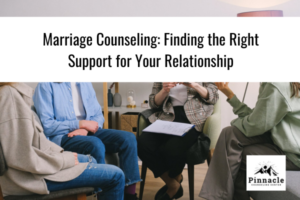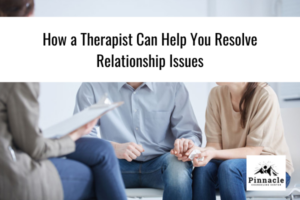Marriage is a journey filled with joy, challenges, and growth. For many couples, there come times when they may face difficulties that seem insurmountable. During such times, seeking professional help can make a significant difference.

Marriage counseling offers couples a platform to address their issues constructively, rekindle their bond, and build a stronger relationship. If you’re searching for effective marriage counseling, consider Pinnacle Counseling Center. They provide compassionate and professional services to help couples navigate their relationship challenges.
Understanding Marriage Counseling
Marriage counseling, also known as couples therapy, is a type of psychotherapy aimed at helping couples improve their relationship. It is a collaborative process where both partners work with a trained therapist to identify issues, communicate better, and find solutions. This form of therapy can address various aspects of a relationship, including communication problems, sexual difficulties, conflicts, and issues arising from external stressors like financial pressures or family dynamics.
Marriage counseling is based on the premise that relationship difficulties are best addressed together. The counselor acts as a mediator, facilitating discussions and helping couples find mutually acceptable solutions to their problems. The goal is not only to resolve conflicts but also to improve overall relationship satisfaction.
Benefits of Marriage Counseling
- Improved Communication: One of the primary benefits of marriage counseling is the enhancement of communication between partners. A counselor helps couples express their feelings and thoughts openly and honestly, leading to better understanding and fewer misunderstandings.
- Conflict Resolution: Counselors provide couples with tools and strategies to resolve conflicts healthily and constructively. Learning how to handle disagreements without resorting to hostility or withdrawal is crucial for a healthy relationship.
- Strengthening Emotional Connection: Marriage counseling can help couples reconnect emotionally. Through guided exercises and discussions, couples can rediscover the emotional intimacy that brought them together in the first place.
- Addressing Underlying Issues: Often, couples face issues that are deeply rooted in past experiences or unresolved conflicts. Counseling helps bring these issues to the surface and address them in a safe and supportive environment.
- Building Trust: Trust is the foundation of any relationship. Counseling can help rebuild trust that may have been damaged due to infidelity, dishonesty, or other breaches of trust.
- Enhanced Problem-Solving Skills: Marriage counseling teaches couples effective problem-solving skills. These skills can be applied not only to relationship issues but also to other areas of life, making the overall partnership stronger and more resilient.
Common Issues Addressed in Marriage Counseling
Marriage counseling can help with a wide range of issues. Some of the most common problems that bring couples to therapy include:
- Communication Problems: Poor communication is a common issue that can lead to misunderstandings, resentment, and conflict. Counseling can help couples learn effective communication skills.
- Infidelity: Affairs can devastate a relationship. Counseling provides a space for couples to process their emotions, rebuild trust, and decide the future of their relationship.
- Sexual Issues: Differences in sexual desire, intimacy issues, and other sexual problems can strain a marriage. A counselor can help couples address these issues openly and find solutions.
- Financial Stress: Money is a significant source of stress for many couples. Counseling can help partners discuss financial issues constructively and develop a plan to manage their finances together.
- Parenting Challenges: Raising children can be stressful and lead to disagreements about parenting styles, discipline, and responsibilities. Counseling can help couples find common ground and work together as a team.
- Blended Family Issues: Blending families can create unique challenges. Counseling can assist in navigating the complexities of step-parenting and integrating different family cultures.
- Life Transitions: Major life changes, such as moving, changing jobs, or dealing with illness, can put a strain on a marriage. Counseling can help couples navigate these transitions and maintain a strong connection.
- Emotional Distance: Over time, some couples may feel emotionally distant from each other. Counseling can help them understand the reasons for this distance and work on reconnecting.
The Process of Marriage Counseling
Marriage counseling typically follows a structured process designed to help couples achieve their goals. Here’s what you can expect:
- Initial Assessment: The first session usually involves an assessment of the relationship. The counselor will ask questions about the history of the relationship, the current issues, and the goals for therapy.
- Setting Goals: After the initial assessment, the counselor will help the couple set specific, achievable goals for their therapy. These goals will guide the counseling process.
- Therapy Sessions: Regular therapy sessions will involve discussions, exercises, and activities designed to address the couple’s issues. The counselor will facilitate communication, provide feedback, and teach skills to help the couple improve their relationship.
- Homework: Counselors often assign homework to help couples practice the skills they learn in therapy. This may include communication exercises, journaling, or other activities to reinforce the therapy work.
- Progress Evaluation: Throughout the therapy process, the counselor will evaluate the couple’s progress and adjust the approach as needed. This ensures that the therapy remains effective and aligned with the couple’s goals.
- Termination and Follow-Up: Once the couple has achieved their goals, the counselor will help them prepare for termination of therapy. Follow-up sessions may be scheduled to ensure that the couple maintains the progress they have made.
Looking for a nearby Marriage Counselor?
Strengthen your relationship with marriage counseling in Nephi, UT. Discover nearby therapists, explore treatment options, and find the right fit for your needs.
Finding the Right Marriage Counselor
Finding the right marriage counselor is crucial for the success of the therapy. Here are some tips to help you choose the right professional:
- Check Qualifications: Ensure the counselor is licensed and has specialized training in marriage and family therapy.
- Look for Experience: An experienced counselor will have dealt with a wide range of issues and will be better equipped to handle your specific situation.
- Consider Compatibility: It’s essential to feel comfortable with your counselor. Look for someone who makes you feel understood and respected.
- Ask for Referrals: Personal recommendations from friends, family, or healthcare providers can be valuable in finding a good counselor.
- Read Reviews: Online reviews can provide insight into the experiences of other couples and help you gauge the effectiveness of a counselor.
- Evaluate Their Approach: Different counselors have different approaches to therapy. Some may be more directive, while others may take a more collaborative approach. Consider what style will work best for you and your partner.
- Initial Consultation: Many counselors offer an initial consultation. Use this opportunity to ask questions and determine if the counselor is a good fit for your needs.
How to Make the Most of Marriage Counseling
To get the most out of marriage counseling, both partners need to be committed to the process. Here are some tips to maximize the benefits of counseling:
- Be Open and Honest: Share your thoughts and feelings openly with your counselor and your partner. Honesty is crucial for effective therapy.
- Be Willing to Change: Be open to making changes in your behavior and attitudes. Growth often requires stepping out of your comfort zone.
- Practice Outside of Sessions: Apply what you learn in therapy to your daily life. Consistent practice is key to making lasting changes.
- Stay Patient: Progress may be slow at times. Be patient with yourself, your partner, and the process.
- Communicate with Your Counselor: If something isn’t working or if you have concerns, talk to your counselor. They can adjust the approach to better meet your needs.
- Focus on the Positive: While addressing issues is important, also take time to acknowledge and celebrate the strengths and successes in your relationship.
The Role of Pinnacle Counseling Center
Pinnacle Counseling Center stands out as a beacon of hope for couples facing relationship challenges. With a team of highly qualified and compassionate therapists, they offer a range of services designed to meet the unique needs of each couple. Whether you’re dealing with communication issues, infidelity, or other challenges, Pinnacle Counseling Center provides a safe and supportive environment to work through your problems and build a stronger, healthier relationship.
Their holistic approach considers the emotional, mental, and practical aspects of relationships, ensuring that couples receive comprehensive support. Pinnacle Counseling Center’s commitment to fostering healthy relationships makes them a trusted choice for many couples seeking marriage counseling.
Conclusion
Marriage counseling can be a transformative experience for couples facing difficulties in their relationship. By improving communication, resolving conflicts, and addressing underlying issues, couples can rebuild their bond and create a more fulfilling partnership. If you’re in need of professional support, consider reaching out to Pinnacle Counseling Center. Their dedicated team is committed to helping couples navigate their challenges and achieve lasting relationship health. Don’t wait for problems to resolve themselves; take the proactive step towards a happier, more connected relationship today.
With the right support, couples can overcome their challenges and strengthen their relationship. Marriage counseling offers the tools and guidance needed to navigate the complexities of a partnership and emerge stronger together. Pinnacle Counseling Center is here to help you on this journey, providing expert care and compassionate support every step of the way.


